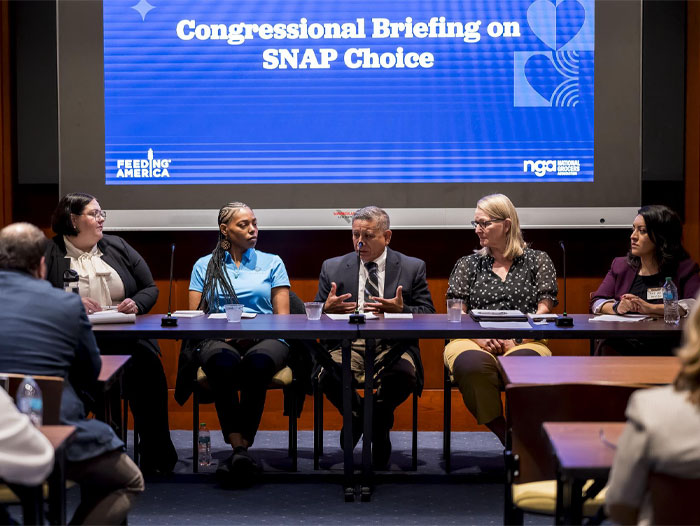NGA and Feeding America Hold Congressional Briefings on the Importance of Maintaining SNAP Choice
September 19, 2024 | 4 min to read
A congressional briefing by the National Grocers Association and Feeding America emphasized the critical need to maintain SNAP Choice in the U.S., as experts warned that proposed restrictions could worsen food insecurity for 42 million recipients. Panelists, including grocery retailers, expressed that limiting food options would increase reliance on food banks, which lack resources to meet rising needs. The briefing aimed to inform lawmakers about the detrimental impacts of such restrictions on families, businesses, and the overall efficiency of the SNAP program.

Panel of Experts, Including a Grocery Retailer, Highlight Experiences that Show SNAP Choice is Essential
Washington, D.C. – The National Grocers Association (NGA) and Feeding America held a congressional briefing on the necessity of maintaining SNAP Choice throughout the United States. The briefing consisted of expert speakers on the Supplemental Nutrition Assistance Program (SNAP), including an independent grocery retailer, a person with lived experience on SNAP, and a food bank advisor.
“SNAP Choice ensures families can shop with the same dignity as other customers and allows grocery stores to treat SNAP recipients like other customers at the register,” said NGA Vice President of Government Relations Stephanie Johnson. “This protection keeps the SNAP program efficient and effective.”
Currently, individuals using SNAP benefits have the freedom to choose the foods they want at their local grocery store. Recent proposals in Congress aim to restrict what recipients can purchase to feed their families, which risks pushing people even further into food insecurity.
“The proposals coming out of Congress would be detrimental to the 42 million SNAP recipients across the United States,” said Karen Siebert, public policy and advocacy advisor for Harvesters – The Community Food Network. “When you limit access to food in grocery stores, people often turn to food banks or other community programs, and we simply don’t have the resources to meet the nutritional needs of that many people.”
“Policing people’s food choices is simply impractical, expensive, and demeaning to families like mine who utilize SNAP benefits,” said Jimmeika Mills, cofounder of Equitable Spaces. “Instead of proposing ways to restrict access to food, our lawmakers should directly engage more of their constituents impacted by hunger and nutrition-related health disparities to co-design sustainable policy solutions.”
Over the last several months, NGA and its members have been imploring Congress stop considering unnecessary restrictions to SNAP.
In May, independent grocer Michael Gay testified before Congress on the importance of SNAP Choice, stating that SNAP restrictions will drive up food costs and strangle a successful public assistance program with needless red tape. In February, 2,500 grocers signed a letter to Congress opposing SNAP restrictions.
The briefing also informed lawmakers about the burdensome ripple-effects of SNAP restrictions, like longer wait times at the register, difficultly keeping approved items in stock, and the labor and capital costs for implementing such a dramatic change.
“I serve a wide variety of customers, including those who utilize SNAP benefits,” said independent grocer and panelist Carlos Castro Sr. of Todos Supermarket. “Right now, I want to invest more in my stores to upgrade our technologies and strengthen the store experience for my customers. But the costs associated with these proposed regulations are making me put those plans on hold, so everyone stands to lose.”
“For Members of Congress, we hope this briefing highlighted the countless negative impacts that SNAP restrictions would have on their constituents and local businesses in their state or Congressional District,” Feeding America’s Manager of Congressional Relations Lanette Garcia Rivera.
About NGA
NGA is the national trade association representing the retail and wholesale community grocers that comprise the independent sector of the food distribution industry. An independent retailer is a privately owned or controlled food retail company operating a variety of formats. The independent grocery sector is accountable for about 1.2 percent of the nation’s overall economy and is responsible for generating more than $250 billion in sales, 1.1 million jobs, $39 billion in wages and $36 billion in taxes. NGA members include retail and wholesale grocers located in every congressional district across the country, as well as state grocers’ associations, manufacturers and service suppliers. For more information about NGA, visit www.nationalgrocers.org.
